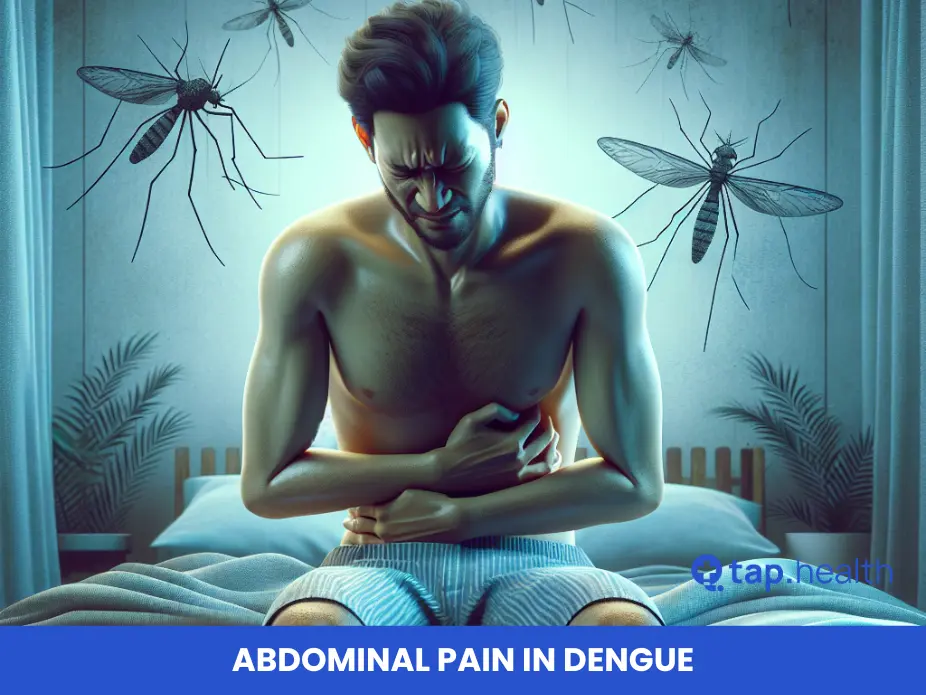Dengue fever, a mosquito-borne viral infection, affects millions in tropical and subtropical regions. While many associate dengue with high fever and joint pain, abdominal pain is a critical symptom that can signal severe complications. This blog explores the causes, significance, and management of abdominal pain in dengue, offering insights into its diagnosis and prevention.
What is Dengue Fever?
Dengue is a viral infection transmitted by Aedes mosquitoes, primarily Aedes aegypti. Caused by four distinct serotypes (DENV-1 to DENV-4), it spreads in regions like Southeast Asia, Africa, and Central America. The incubation period ranges from 4 to 10 days, with symptoms varying from mild to life-threatening.
Key Facts About Dengue:
- Transmission: Spread through bites of infected female mosquitoes.
- Geographical Prevalence: Common in tropical and subtropical climates.
- Immunity: Infection with one serotype grants lifelong immunity to it but not others, allowing multiple infections.
Symptoms of Dengue Fever
Dengue progresses through three phases: febrile, critical, and recovery. Each phase presents distinct symptoms, with abdominal pain often emerging in the critical phase.
Febrile Phase
- High Fever: Sudden onset, reaching up to 104°F (40°C).
- Headache: Intense, often around the forehead.
- Retro-orbital Pain: Pain behind the eyes.
- Muscle and Joint Pain: Known as “breakbone fever” due to severe discomfort.
- Nausea and Vomiting: Common gastrointestinal issues.
- Rash: Red, blotchy rash appearing days after fever onset.
Critical Phase
- Abdominal Pain: Persistent or severe pain, a warning sign of complications.
- Bleeding: Includes nosebleeds, bleeding gums, or blood in vomit/stool.
- Plasma Leakage: Leads to fluid buildup, potentially causing shock.
- Low Platelet Count: Increases bleeding risk.
Recovery Phase
- Improved Symptoms: Gradual relief from fever and pain.
- Fatigue: Prolonged tiredness post-recovery.
- Rash: May reappear during recovery.
Why Does Abdominal Pain Occur in Dengue?
Abdominal pain in dengue is a concerning symptom, particularly during the critical phase. It can range from mild discomfort to severe pain, often indicating complications like Dengue Hemorrhagic Fever (DHF) or Dengue Shock Syndrome (DSS).
Causes of Abdominal Pain in Dengue
- Plasma Leakage
- Explanation: Severe dengue increases vascular permeability, causing plasma to leak into the abdominal cavity.
- Impact: Results in swelling and pain; untreated, it may lead to shock.
- Liver Involvement
- Explanation: The dengue virus can inflame the liver (hepatitis), causing enlargement (hepatomegaly).
- Impact: Leads to pain in the upper right abdomen, sometimes with jaundice.
- Gastrointestinal Bleeding
- Explanation: Severe dengue may cause bleeding in the stomach or intestines.
- Impact: Sharp pain, with symptoms like blood in vomit (hematemesis) or stools (melena), requiring urgent care.
- Gallbladder Inflammation
- Explanation: Dengue can cause acalculous cholecystitis, inflammation without gallstones.
- Impact: Causes pain in the upper right abdomen, often with nausea.
- Pancreatitis
- Explanation: Rarely, dengue triggers pancreatic inflammation.
- Impact: Severe pain radiating to the back, accompanied by nausea.
Differentiating Dengue-Related Abdominal Pain
Abdominal pain is a common symptom across various conditions, making accurate diagnosis critical. Conditions mimicking dengue-related abdominal pain include:
- Acute Pancreatitis: Sudden, severe pain from pancreatic inflammation.
- Acalculous Cholecystitis: Gallbladder inflammation without gallstones.
- Acute Appendicitis: Pain in the lower right abdomen from appendix inflammation.
Diagnostic Approach:
- Medical History: Doctors assess travel history and mosquito exposure.
- Physical Exam: Checks for tenderness or swelling.
- Blood Tests: Detects dengue antibodies or low platelet counts.
- Imaging: Ultrasounds or CT scans identify organ issues or fluid buildup.
Why Abdominal Pain in Dengue is a Red Flag
Abdominal pain often signals severe dengue forms like DHF or DSS. It may indicate:
- Plasma Leakage: Leading to shock or low blood pressure.
- Organ Damage: Affecting the liver, kidneys, or gastrointestinal tract.
When to Seek Help:
- Severe Pain: Persistent or worsening pain requires immediate attention.
- Associated Symptoms: Vomiting blood, rapid breathing, or confusion are emergencies.
- Signs of Shock: Cold, clammy skin, dizziness, or fainting.
Diagnosing Abdominal Pain in Dengue
Accurate diagnosis guides effective treatment. Common diagnostic methods include:
- Clinical Examination
- Purpose: Assesses pain severity and related symptoms.
- Findings: Tenderness, swelling, or bleeding signs.
- Blood Tests
- Purpose: Monitors platelet levels, liver function, and clotting ability.
- Findings: Low platelets, abnormal liver enzymes, or coagulopathy.
- Imaging Studies
- Purpose: Visualizes organs via ultrasound or CT scans.
- Findings: Enlarged liver, gallbladder inflammation, or fluid accumulation.
- Endoscopy
- Purpose: Identifies gastrointestinal bleeding sources.
- Findings: Ulcers or erosions in the stomach lining.
Managing Abdominal Pain in Dengue
Effective management focuses on symptom relief, addressing causes, and preventing complications.
Medical Treatments
- Hydration
- Why It Matters: Prevents dehydration, which worsens pain and plasma leakage.
- How It’s Done: Oral rehydration solutions or IV fluids based on severity.
- Pain Relief
- Why It Matters: Reduces discomfort and stress on the body.
- How It’s Done: Paracetamol is safe; avoid NSAIDs like aspirin due to bleeding risks.
- Monitoring and Supportive Care
- Why It Matters: Tracks complications in severe cases.
- How It’s Done: Regular blood tests, vital sign checks, and interventions like oxygen or transfusions.
- Treating Complications
- Why It Matters: Addresses life-threatening issues like bleeding or shock.
- How It’s Done: Platelet transfusions, blood transfusions, or endoscopic procedures.
Home Care Tips
- Rest: Supports the body’s fight against the virus.
- Nutrition: A balanced diet aids recovery, avoiding foods that irritate the stomach.
Preventing Abdominal Pain in Dengue
Preventing dengue itself is the best way to avoid abdominal pain. Key strategies include:
- Mosquito Control
- Use repellents and wear long sleeves.
- Sleep under bed nets in high-risk areas.
- Eliminate Breeding Sites
- Remove stagnant water from containers and cover water storage.
- Support community clean-up drives.
- Vaccination
- Consult healthcare providers about dengue vaccines, typically for those previously infected.
When to Seek Medical Attention
Prompt action can be life-saving. Seek immediate care if you experience:
- Severe Abdominal Pain: Intense or worsening pain.
- Warning Signs: Blood in vomit/stool, rapid breathing, or confusion.
- Shock Symptoms: Cold skin, dizziness, or fainting.
Follow-Up: Regular check-ups ensure the disease doesn’t progress silently.
FAQs About Abdominal Pain in Dengue
Q1: Is abdominal pain common in all dengue cases? A1: No, it’s more common in severe cases, especially during the critical phase, and may signal complications.
Q2: How can I manage mild abdominal pain at home? A2: Stay hydrated, rest, and use paracetamol. Seek medical help if pain worsens or new symptoms appear.
Q3: Can abdominal pain in dengue be prevented? A3: Preventing dengue through mosquito control and vaccination reduces the risk of abdominal pain.
Q4: What tests diagnose abdominal pain in dengue? A4: Blood tests, imaging (ultrasound/CT), and endoscopy help identify the cause, such as plasma leakage or bleeding.
Conclusion
Abdominal pain in dengue is a critical symptom that demands attention, as it may indicate severe complications like plasma leakage, liver damage, or gastrointestinal bleeding. Understanding its causes, seeking timely diagnosis, and following proper management strategies can significantly improve outcomes. By prioritizing prevention through mosquito control and vaccination, you can reduce the risk of dengue and its associated symptoms. Stay vigilant, and consult a healthcare provider immediately if severe symptoms arise.



